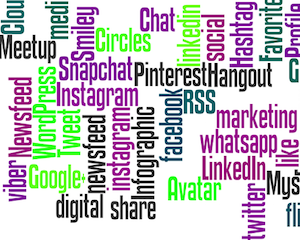Writing and reading permeates our everyday life. We have never read or written as much as we do today.
Think about your day. Think about your email alone. And, at what other time in history, would you have received and read hundreds of ‘letters’ a day. In what era would you then be expected to write answers to dozens of them!
Every day, we are exposed to 174 newspapers worth of information, including videos and photos as well as words, Dr Martin Hilbert and his team at the University of Southern California discovered.
The average office worker spends 28 hours a week – or nearly 1500 hours a year – writing emails, searching for information and attempting to ‘collaborate’ internally, according to a report by McKinsey Global Institute, the research arm of management consultancy McKinsey & Company.
Now add social media: LinkedIn, Facebook and Twitter. News sources, old and new.
Words are everywhere.
What is your ‘words wish-list?’
Too often, the words we read leave us cold.
Do you ever wish the emails, blogs and websites you read could have been clearer, simpler, or shorter?
As we watch our inbox fill – as if they were the winner’s tray in a pokie machine instead of a long list of demands – we begin to worry how much time will be lost scouring irrelevant emails in an effort not to miss the one that matters?
How many of these messages meant for us, are meant to help us? And how do we find the ones that matter?
The ones that matter
How easily we recognise the ones that matter; the messages that make a difference to our day.
They shine from within the heap. They inspire us. The writing is funny or moving. It is precise and to the point. It is complete; everything we need to know and nothing more. Or, perhaps, it takes us deep into another world, a new level of awareness or insight.
I received such an email recently. A friend shared a link with me, adding her note: ‘One of the most extraordinarily simple, beautiful things I have read/viewed for a long time …’ I clicked. I read. I was moved. I felt changed.
It was a beautiful story about euthanasia, telling the story of a couple who chose to end their lives, dying together by their own hands when their health had deteriorated beyond what they deemed an acceptable life.
Among my friends in the following few days, we had all read it and were talking about it. It made us think and feel. It felt personal.
We recognise words that have the power to influence us. As readers, we know instantly, without thinking, when we feel ‘at home.’
What have you read recently that moved you, that made you stand up from your desk and take action, or where you glimpsed an insight into the writer behind the words?
It’s not the style of content that matters. It is not about whether we are reading a blog or a letter, a report or a book. What I am saying is that we instinctively know when we are reading the truth, and that the motivation behind it is sincere.
From the shortest of notes to a full-length book, we are moved when we find words that accurately describe what matters to us, or about what might matter to us.
Writing is a very underestimated skill. It is more demanding today than ever before. Tweets, posts, slide decks, articles, blogs, reports, proposals, pitches, speeches and, of course, the endless emails. We have so many forms to master. We text, we use Emoji.
Writing has never been a more important skill than it is today.

